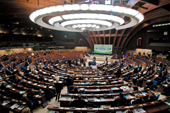
Russia is on the verge of restoring its voting right in CoE
By Gvantsa Gabekhadze
Monday, May 20
Russia may restore its voting right in the Council of Europe [CoE] which he was deprived of after the annexation of Crimea in 2014.
Last week, during the CoE ministerial in Helsinki, the Committee of Minister at the Deputy Level adopted a document, dedicated to the 70th anniversary of the council, with its two top points reading the following:
1. Recalled that all Member States shall be entitled to participate on an equal basis in the two statutory organs of the Council of Europe, as long as Articles 7, 8 or 9 of the Statute have not been applied;
2. Recalled that one of the fundamental obligations of member States is to pay their obligatory contributions to the Ordinary Budget, as provided by Article 38 of the Statute.
Russia has been one of the top financial contributors in the Coe, with annual 33 EUR membership fee, which it refused to pay in 2017 as the sign of protest regarding the voting right, triggering the budgetary crisis in the CoE.
Georgia, Ukraine and the Baltic States are strongly opposing the restoration of the voting right to Russia, saying that the country must be held accountable for its illegal activities in other countries, including Georgia and Ukraine.
”It is vital for the Council of Europe remain faithful to its values and the countries which refuse to fulfill their obligations to be held accountable for that. That is why we did not support the decision in Helsinki,” Zalkaliani said, adding that the final decision is to be made by the Parliamentary Assembly of the Council of Europe [PACE].
He hoped the final decision would be negative for Russia.
During his speech at PACE in April, Georgian Prime Minister Mamuka Bakhtadze stated:
“Russia must pay its membership fee in the council, and no concessions must be made in this regard.
The Georgian government decided to contribute 500,000 EUR to the CoE budget as a sign of gratitude in the time of the budgetary crisis.
Russia must not be given the chance to use its financial levers to regain the right.”
The 47-member council, which is not linked to the European Union, promotes democracy and the rule of law across Europe.


